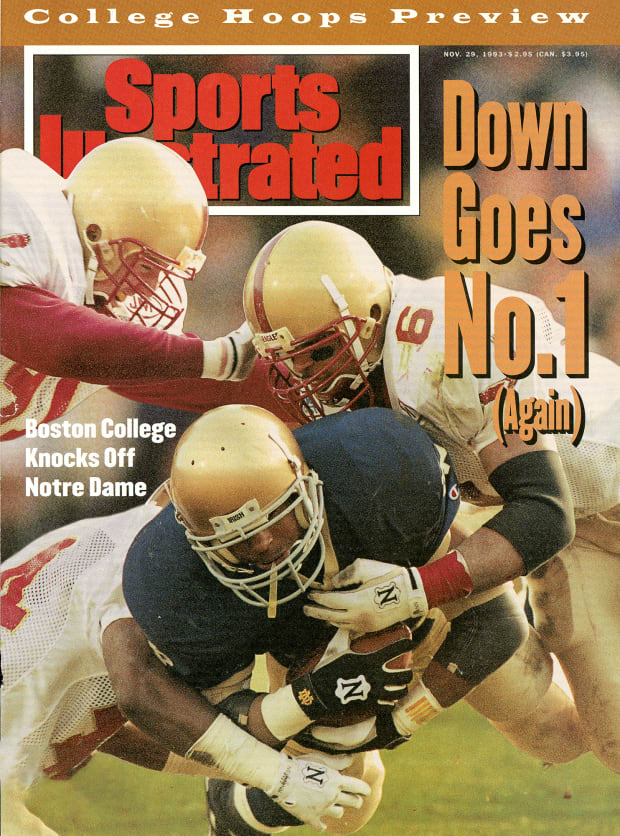Good morning, I’m Dan Gartland. Hopefully the USMNT’s World Cup journey doesn’t end today.
In today’s SI:AM:
⚽ World Cup knockout stage scenarios
🚢 The fans sleeping in shipping containers
If you're reading this on SI.com, you can sign up to get this free newsletter in your inbox each weekday at SI.com/newsletters.
It all comes down to this
Today marks the beginning of the most important four days of the World Cup thus far. After yesterday’s action, all 32 teams have played two of their three group-stage games. Only three teams (France, Brazil and Portugal) have already secured spots in the knockout round and just two (Qatar and Canada) have been eliminated. That means there are 27 teams competing for the remaining 13 knockout-round spots. It’ll all be decided between now and Friday.
Today is the decisive day for the U.S. men’s national team, which will face Iran at 2 p.m. ET. The stakes are simple. If the U.S. wins, it’s through to the knockout stage. If it draws or loses, it’s eliminated. The situation is nearly as straightforward for Iran, which will advance with a win against the U.S. or if it draws and Wales loses to England. The build-up to the match has been tense, given the political tensions between the U.S. and Iran. U.S. Soccer made things worse when it removed the emblem of the Islamic Republic from the Iranian flag in a social media post, sparking fierce backlash from Iran’s government. The federation said the change was meant to be a gesture of support for the protesters in Iran. But the federation inadvertently put pressure on members of the World Cup squad, Brian Straus writes:
The gesture was well-meaning, but it was mistimed, clumsy and appeared to accomplish little but infuriating the Iranian press corps. Monday's “match day minus one” scene at the Qatar National Convention Centre was tense and surreal. Berhalter and U.S. midfielder Tyler Adams, who were a bit more than 24 hours away from a career-defining game, were grilled about those social media posts, inflation and the U.S. economy, systemic racism in the U.S., American immigration policy, the Persian Gulf presence of the U.S Navy, their pronunciation of the country’s name and Iran coach Carlos Queiroz’s recent verbal spat with former U.S. manager and current BBC pundit Jurgen Klinsmann over the German’s comments concerning Iranian soccer culture.
Turning our attention back to the match, the U.S.’s strong performance against a talented England team has to inspire confidence headed into today’s contest. The U.S. didn’t grind out a 0–0 draw by sheer luck—it was an evenly matched game in which the U.S. played 90 solid minutes, as opposed to the 45 good ones it played against Wales. Iran is probably a better team than its 6–2 loss to England would indicate (a 2–0 win against Wales, even with the two goals coming after the Welsh goalkeeper was sent off, supports that notion) so this won’t be a walkover. The U.S. is a slight favorite to win, according to SI Sportsbook, but the fact that a draw won’t be sufficient to advance will make this a nerve-wracking game.
Now for the other 15 remaining group-stage matches. Marcus Krum has analyzed every knockout stage scenario but here are a few to keep your eye on:
- Group A: At the risk of looking ahead, this is the group to watch from a U.S. standpoint. If the U.S. advances, it would face the winner of this group (unless England loses to Wales). That could be either the Netherlands, Ecuador or Senegal. Those teams are playing their final group stage matches this morning.
- Mexico: El Tri needs some serious help to get out of the group. The simplest path forward is to beat Saudi Arabia tomorrow by four or more goals. Or Mexico can beat Saudi Arabia and advance if Poland beats Argentina. With a Mexico win and an Argentina win or draw, it’ll come down to goal differential.
- Germany: The 2014 champions are also in need of a win. After a loss to Japan and a draw against Spain, the Germans are in last place in their group. They need to beat Costa Rica on Thursday and hope Spain beats Japan. With a Japan win or a draw, Germany can only advance on goal differential.
- Morocco: The 2–0 win over Belgium on Sunday was Morocco’s first at the World Cup since 1998. The Atlas Lions’ only knockout stage appearance was in ’86. They can get back there with a win or draw against Canada on Thursday and even with a loss, they can still potentially advance on goal differential.
The best of Sports Illustrated

In today’s Daily Cover, Greg Bishop looks at the sometimes unorthodox housing solutions at the World Cup in Qatar:
On the ground, roughly a week before the World Cup opener, none of the odd lodging spots had opened. Construction continued, at all hours, even through the night. It wasn’t possible to look inside, even, not at the tent village in Al Khor, not at the fan village stocked with shipping containers and not at the cruise ships. They were all heavily guarded. And the guards, while not unfriendly, all insisted that only ticket holders—not journalists or those who flew in for the atmosphere and will not step foot inside the stadiums—are allowed.
Pat Forde writes that there seems to be a correlation between the coaching carousel and the late-season performance of the top targets’ teams. Forde also writes that Auburn and Hugh Freeze deserve each other. … Tom Verducci wonders what happened to all the great center fielders. … The Suns and Cavs made the biggest jumps in Kyle Wood’s NBA power rankings.
Around the sports world
Michigan backup quarterback Cade McNamara will enter the transfer portal. … Miguel Cabrera says the upcoming MLB season will likely be his last. … The Big Ten has handed down punishments for the Michigan-Michigan State tunnel incident. … Deion Sanders confirmed that Colorado offered him its head coaching position. … A Qatari official estimated that between 400 and 500 workers died in connection with the World Cup. … Colts interim coach Jeff Saturday had his first misadventure in clock management.
The top five...
… things I saw last night:
5. Kristaps Porziņģis’s 41-point night against the Timberwolves.
4. Leon Draisaitl and Conor McDavid’s two-man play for the Oilers’ overtime game winner.
3. The field storming after Ronald Acuña Jr. won the Venezuelan home run derby.
2. Kevin Durant’s cocky interview response after dropping 45 points.
1. Andrew Nembhard’s buzzer beater to lift the Pacers over the Lakers.
SIQ
Russell Wilson, who turns 34 today (sorry, Broncos fans), was also an excellent baseball player when he was younger. He was drafted out of high school in the 41st round by the Orioles. Which team selected him in the fourth round of the 2010 MLB draft out of NC State?
- Rockies
- Rangers
- Yankees
- Mariners
Yesterday’s SIQ: Besides Dave Righetti and Dennis Eckersley, who is the only other pitcher to throw a no-hitter and also lead the AL or NL in saves?
- John Smoltz
- Derek Lowe
- Aroldis Chapman
- C.J. Wilson
Answer: Derek Lowe. He led the AL with 42 saves in 2000 before the Red Sox converted him to a starter, and he threw a no-hitter against the Devil Rays on April 27, 2002. He was an All-Star for the second time in his career that season and finished third in Cy Young voting behind teammate Pedro Martinez and winner Barry Zito.
Unlike Eckersley and Righetti, who began their careers as starters and then moved to the bullpen, Lowe was primarily a reliever for the first five years of his career and spent two seasons as Boston’s closer before he made a permanent move to the rotation.
What makes Lowe’s career interesting is that he debuted as a starter for the Mariners in 1997 and struggled, pitching to a 6.96 ERA in 12 appearances (nine starts). Seattle traded him to Boston, where he flourished as a reliever. When he began to struggle in that role in the 2001 season, the Red Sox acquired Ugeth Urbina from the Expos, and Lowe asked to be moved to the rotation. He made three strong starts late in the season and started the next season in the rotation. Two years later he was a key part of the postseason rotation for the Red Sox team that broke Boston’s World Series drought.
From the Vault: Nov. 29, 1993

Joe Raymond/Sports Illustrated
The Nov. 7, 1992, meeting between No. 8 Notre Dame and No. 9 Boston College in South Bend was one of the biggest games of the college football season. Or it was supposed to be. The Eagles got embarrassed in a 54–7 blowout loss. But BC had a chance for revenge a year later and it seized it in a major way.
Notre Dame entered the game as the No. 1 team in the country after beating the previous No. 1, Florida State, the week before. It was the last game of the regular season for the Irish. Beat the Eagles and they’d be headed to the national championship game. It was a foregone conclusion, William F. Reed wrote:
The final home date of Notre Dame’s season was supposed to be a party, a celebration of an unbeaten record and [Lou] Holtz’s big-game coaching. Although Holtz had cautioned that the BC game was more than a “victory lap,” nobody paid much attention. The main topic at the tailgate parties was how unfair it was that the bowl coalition might force a Notre Dame-Florida State rematch at the Fiesta Bowl in Tempe, Ariz.
And what about the chance of an upset by Boston College? Naaah. Last season in South Bend the Irish had undressed an Eagle team that came into the game undefeated and ranked No. 9 in the nation. In intradenominational disputes, Touchdown Jesus always favors the Irish. How else to explain that Notre Dame had never, not in 106 fabled years of football, lost to another Catholic school?
BC had other plans, though. The Eagles raced out to a 38–17 lead before turnovers allowed Notre Dame to get back in the game. Thanks in large part to two fumbled snaps by BC’s senior quarterback Glenn Foley, the Irish were able to take a 39–38 lead with 1:09 left to play. But then Foley led a last-minute drive that ended with a game-winning field goal by David Gordon as time expired. Winning would have been satisfying enough for BC. Winning in such dramatic fashion to deny Notre Dame a national championship opportunity was special.
Check out more of SI’s archives and historic images at vault.si.com.

.jpg?w=600)





